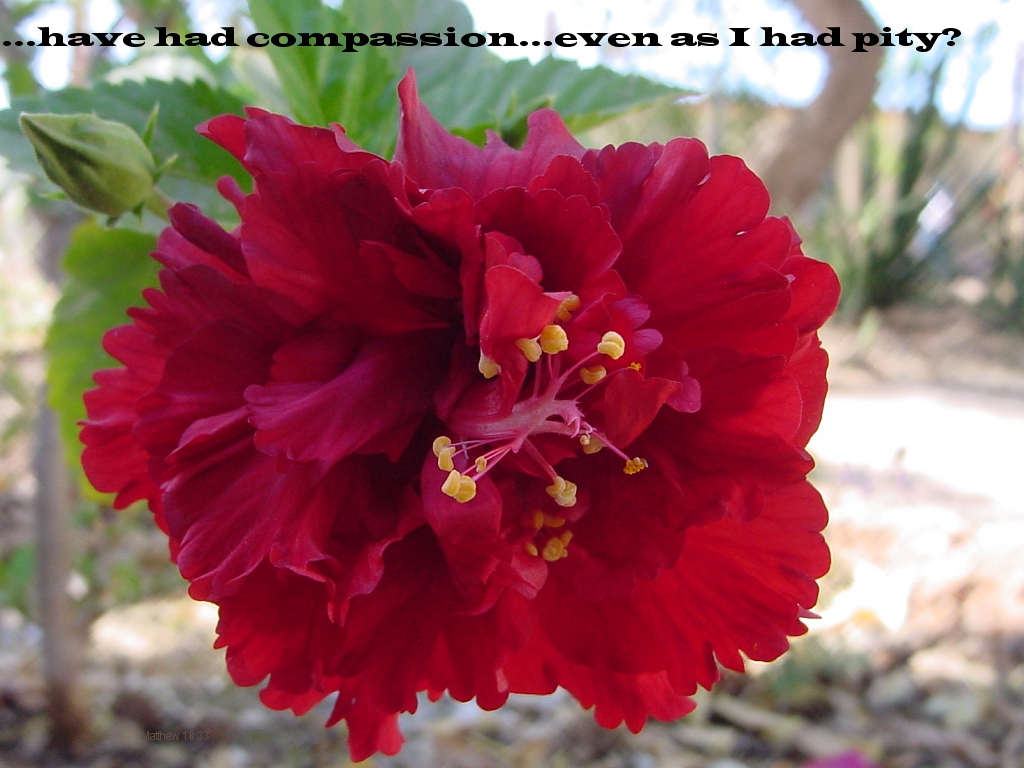Matthew 18:21-35 — a story on the imperative of forgiveness
The evil servant (aka, Servant A) found himself condemned and judged by his own words:
- “You better pay me all!”
- “No compassion or mercy for you — off to prison until you pay me all!”
Tough guy. Right after he hadn’t been so tough.
He asked for patience, for time to pay all. He received mercy as well as forgiveness of all. But I don’t recall thinking about this in verse 32 til this morning: He had actually desired to be forgiven all that debt. Thus, his master responded to more than just his words; he responded to the unspoken desire of his heart. I need much sharper sensitivity and discernment in my relationships with those who wrong me!
The “magical” words that worked for Servant A did not work on Servant A. When he uttered them to his master, his master forgave him. Alas, when his fellow servant uttered them to him, he refused to forgive his fellow servant.
Forgiveness in human relationships is both seed and fruit in my relationship with God. Here’s what I mean that shows the imperative of forgiveness:
- Seed: Jesus said when I forgive others, I will be forgiven.
- Fruit: God also says I should forgive others because He has forgiven me.
Another way to state the same truth: Forgiveness in human relationships is both cause and effect in my relationship with God.
We could say the same about unforgiveness. If I withhold forgiveness from someone, and I won’t be able to find it when I need it.
(That’s part of what I wrote this morning — read it all here: How Often Should I Forgive?.)
Hard Questions; Difficult Realities in the imperative of forgiveness
By what criteria do I forgive others?
If I quit forgiving someone, what will I do instead?
How is compassion an improvement over patience?
But I keep remembering the offenses against me! Now what?
Recently I was treated as the servant treated his fellow servant. What should I do?
How do I confront (Matthew 18:15-17) and yet forgive (Matthew 18:22,35)?!
Forging forgiveness
- We should set no limit on the offenses we will forgive.
- Compassion should precede forgiveness.
- Those who have been forgiven should show forgiveness.
- Unforgiveness produces a bitter harvest.
Excerpted and adapted from The Crisis of Forgiveness (2010 version!)

Two Choices When Asked for Forgiveness remember the imperative of forgiveness!
“How can you forgive me? I will understand if you never trust me again.” The shame and the pain could not be mistaken. He had violated my trust, had deliberately deceived me, had been unfaithful to his wife, had undermined my standing and leadership in both the church and in the community, had brought great reproach to the name of the Lord, had inflicted great turmoil on the church and had severely destabilized his family…and mine.
But he was my friend.
How do you treat such friends?
The Christian has two basic choices: respond naturally or respond naturally. Yes, ma’am; yes, sir. Those are your options, make no mistake. So take your pick…
Excerpted from Job’s Encounter With God
And finally, one paragraph from a piece Forgiveness I wrote over 20 years ago.
